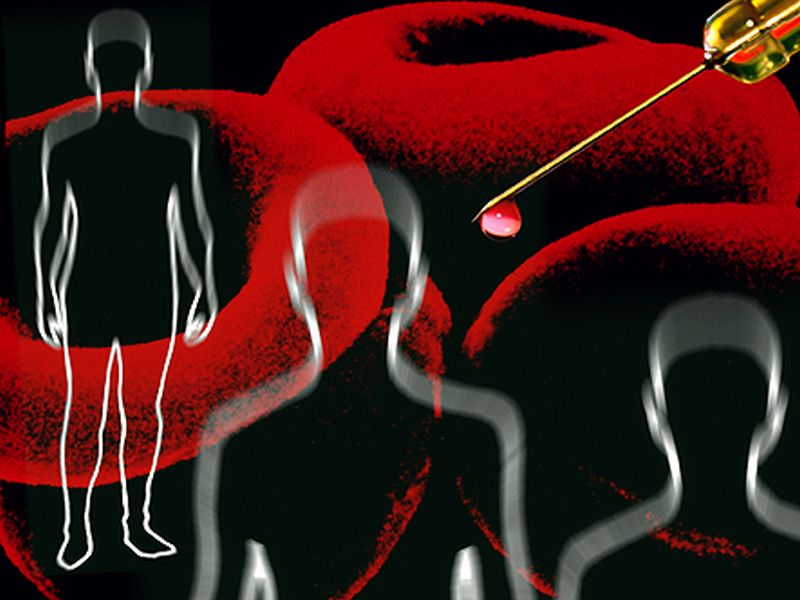 By Amy Norton
By Amy Norton
HealthDay Reporter
WEDNESDAY, Oct. 21, 2020 (HealthDay News)
A combination of two “targeted” therapies can beat back a rare form of blood cancer — without the toxic effects of chemotherapy, a new study has found.
In a trial of 63 patients, researchers found that the drug regimen frequently wiped out all signs of the cancer — a subtype of the blood cancer acute lymphoblastic leukemia (ALL). And at 18 months, 95% of patients were still alive.
Experts said it is too soon to call the approach a “cure.” But they were hopeful the findings, published Oct. 22 in the New England Journal of Medicine, could lead to an effective — and chemo-free — treatment for the cancer.
The disease is a subtype of ALL in which the cancer cells have a genetic abnormality called the Philadelphia chromosome (Ph). Traditionally, Ph-positive ALL had a poor prognosis, but in the past two decades that has changed with the introduction of drugs that target the genetic anomaly.
Those drugs belong to a class called tyrosine kinase inhibitors (TKIs), and include Gleevec — the first TKI approved, back in 2001 — as well as newer ones like Sprycel and Bosulif.
But even with TKIs available, patients with Ph-positive ALL still undergo intensive chemotherapy — and it takes a toll.
Among adults with ALL, 10% to 20% die during chemo, according to Dr. Dieter Hoelzer, of the University of Frankfurt, in Germany. Those risks are even higher for elderly patients, he writes in an editorial published with the study.
Aggressive chemo can substantially lower blood cell counts, which may leave patients vulnerable to infections or in need of multiple blood transfusions, explained Dr. Jae Park.
Park, a leukemia specialist at Memorial Sloan Kettering Cancer Center in New York City, was not involved in the trial.
Park said that a highly effective, chemo-free regimen would “change the landscape” of Ph-positive ALL treatment.
The regimen chosen for the trial, conducted in Italy, included Sprycel and an immunotherapy drug called Blincyto (blinatumomab), which enlists the immune system to find and destroy cancer cells. It is already approved in the United States for certain ALL patients.
The patients in this study were newly diagnosed with Ph-positive ALL and ranged in age from 24 to 82. They first received Sprycel (dasatinib) for 85 days, to try to send the cancer into remission. That was followed by two to five treatment cycles of Blincyto, in an effort to wipe out the remains of the cancer. The drug is given by infusion; each cycle lasts four weeks.
After the initial Sprycel treatment, 98% of patients went into remission. And after the second cycle of Blincyto, 60% were showing a “molecular response” — where sensitive tests detect no signs of the genetic abnormality that marks the cancer.
The patients were followed for up to two years. At that point, 95% were still alive, and 88% were free of a relapse, according to the researchers led by Dr. Robin Foa, of the University of Rome.
“That 88% is pretty remarkable,” Park said. “The big caveat is this was a relatively short follow-up period. It’s too soon to say this is a cure.”
What does seem clear is that the regimen is less toxic than aggressive chemo. Six patients developed an infection with cytomegalovirus (a herpes virus), and four had a drop in white blood cells. One patient died during the initial treatment phase.
Serious side effects were “surprisingly few,” Hoelzer wrote, but questions remain.
One, he noted, is whether the “excellent outcomes” will last. Hoelzer speculated that the answer is “probably yes,” since the majority of ALL relapses happen within two years of starting treatment.
Another big question, Hoelzer wrote, is whether a chemo-free approach could work in other forms of ALL — and open up a “new era” in treating the cancer.
In the real world, there is the issue of cost, and Blincyto is among the priciest of cancer drugs. When it came to market in 2014, the price tag for one treatment cycle was $89,000.
Park pointed out, though, that the current regimen for ALL is long, averaging about three years. The chemo-free approach could shorten that.
In 2020, an estimated 6,150 Americans will be diagnosed with ALL, according to the American Cancer Society. About one-quarter of adults with the disease have the Ph-positive form.

Copyright © 2020 HealthDay. All rights reserved.
SLIDESHOW
Signs of Cancer in Men: Could it Be Cancer?
See Slideshow
References
SOURCES: Jae Park, MD, hematologic oncologist, Memorial Sloan Kettering Cancer Center, New York City; New England Journal of Medicine, Oct. 22, 2020







Leave a Reply